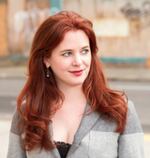
Brisa Trinchero tells us she was so taken with Lin-Manuel Miranda's previous work, she wrote a blank check for "Hamilton" — sight unseen.
Joan Marcus / Broadway in Portland
What do the hit Broadway shows "Hamilton," "Matilda," "Hedwig and the Angry Itch," and "Pippin" have in common? Lake Oswego native-turned-Broadway producer Brisa Trinchero.
Trinchero grew up working the box office at the Lakewood Theatre Company. Turns out she had a knack for business: By her mid-20s, she was running the Broadway Rose Theatre Company in Tigard. After leading the company through the multi-million-dollar renovation of a new theater, she found herself wanting a new challenge.
"In my mid-20s, having achieved my life goal, I had an early career crisis," she said from her office in New York. "I got addicted to the high-growth, high-risk side of theater."

"Beautiful: The Carole King Musical" tells the story of the most successful female songwriter of the 20th Century. King had 118 pop hits on the "Billboard Top 100," including No. 1 songs like "I Feel the Earth Move" and "It's Too Late."
Joan Marcus / Broadway in Portland
A jump from Broadway Rose to Broadway isn’t so far, right?
Now Trinchero splits her time between Portland and New York, where she produces and invests in musicals, runs a boutique publishing company, and is working on a ticketing start-up. State of Wonder's Aaron Scott caught up with her during a recent trip to the big apple to talk the business they call show, including the hottest ticket on Broadway (#YayHamilton) and her involvement in the touring production of "Beautiful: The Carole King Musical," which plays Portland's Keller Auditorium Nov. 1–6.

Courtesy Brisa Trinchero
Highlights from the Conversation
Aaron Scott: From Tigard to Broadway is a big jump. How did you get involved in your first Broadway show?
Brisa Trinchero: I was fortunate in that when I announced that I was leaving Broadway Rose to go to Broadway, that one of our big supporters and also an actor in Portland, Cory Brunish, had just discovered a show in Florida that he had fell in love with called "Bonnie and Clyde." He said, "I hear you're looking to do Broadway producing. I'm interested in working on this show; let's do this together."
And I called up the producer of "Bonnie and Clyde," which I know now nobody does. But while that show wasn’t successful, I think we'd both say it was probably one of most exciting experiences we've ever had because we really got to see how a Broadway show is created from the ground up.
Scott: What exactly are the duties of a Broadway producer? What does it entail beyond a financial investment?
Trinchero: Well, there are two different types of producers. There are lead producers. They'd be like the CEO of the company. They run everything, they manage hundreds of people, everything from backstage, onstage, box office. That's a full time job day-to-day.
Generally there are one or two lead producers, and they'll get a bunch of co-producers, and that’s what I've been doing. Co-producers help with a variety of things. They'll help with the money raising, because obviously you can’t get anywhere without bringing in, on a musical, $10-15 million.
Then, once you've done that piece, you'll be part of different projects related to the show. You'll be part of the marketing team, you'll be part of promotions — basically, once a Broadway show opens, it's all about getting butts in seats eight days a week, rain or show.
Nobody on the producing side is getting a paycheck. You're investing your time and investing your money in hopes that it becomes a big hit, and you get paid out for years. As they say in Broadway, you can’t make a living, but you can make a killing.
Scott: "Forbes" said just 10 of 36 new Broadway productions last year turned a profit. Do you know your success rate?
Trinchero: I've been fortunate. Early on I created own algorithm. An investor will come to me and say, "I saw the best show," and I say, "there's a difference between investing in show and buying a ticket." My criteria is similar to an angel investor in tech: Who is the producer team? Do they know how to run a business?
I look at budgets. Shows live and die by how much cost to run. You have to sell tickets for eight shows a week: that’s 10,000 or more people a week who have to come in and pay $150-160 for a show, week after week — holidays, snow. If the show is too expensive, one bad week for whatever reason and you have to close.
Then third thing is the content of the show: Does it speak to me, is it entertaining? But I also ask, "Why this, why now?" Is it relevant to today’s audiences?
What I'm really interested in is creating an investment portfolio around Broadway properties that makes money for years on end and makes my investors money for years on end.
Scott: So let’s get to hottest show in world at the moment: "Hamilton." You’re one of 100 investors. Tell me the story of how you got involved in it.
Trinchero: Well, it goes back to "In the Heigts," which is the first show that Lin-Manuel [Miranda] created. I saw that show, completely fell in love with it. It was such a different sound for Broadway. I thought, "Whatever this guy does next, I want to be a part of."
Fast forward a few years, when I heard he had this new piece in the works, I called the producers and said, "Here’s a blank check, whatever he does next, I want to be involved in."
They laughed. If you look at history of Broadway musicals, no writer has hit after hit. It didn’t matter to me; in my opinion he Lin-Manuel is the Mozart of our time. The fact that I had the conversation with the producers five years before "Hamilton" premiered at the Public Theater — they were true to their word. At that point, people were banging down their door, but I got there first."
Scott: What is it about "Hamilton" that's made it appeal to so many people?
Trinchero: It's that it tells such an incredible American story. We all like rags to hear these success stories, these riches stories — this guy who came over as immigrant and rose to success. I think when you add the fact that what he was part of is the building of country, I find it to be really inspiring. Rather than these images we have of dusty old men sitting around a table building our country, it's like, no these were young upstarts who had no idea what they were doing, who had just fought war and who just figured it out. I find you come out of the theater thinking, if they could build a country, if they could figure it out, I can figure out whatever I'm trying to do next.
Scott: Do you have a favorite song?
Trinchero: "Not Throwing Away My Shot." So that's about Hamilton arriving in New York as an immigrant and saying, "Whatever it takes, I'm going for it." That very much how I approached arriving in New York, and I think a lot of people approach arriving in New York in the same way.
Scott: I love the fact that the shows you do here trickle out across the country. "Hamilton" will be coming to Portland in two years, "Matilda" is coming next year. Is there a certain pride in knowing the shows you helped make happen are now entertaining audiences across the country?
Trinchero: I was born and raised in Portland, so these touring shows and the local productions, that was my experience with musical theater. And I loved it. And the fact that now I can be a small part of that canon is — I pinch myself.
There's a great moment in "Beautiful" [The Carole King Musical] that I love every time I see that show no matter where I am in the country. That she starts playing the first few chords of "Will You Still Love Me Tomorrow," and you just here this "ahhhhh" go through the audience. It happens everywhere, and it gives me goosebumps.
